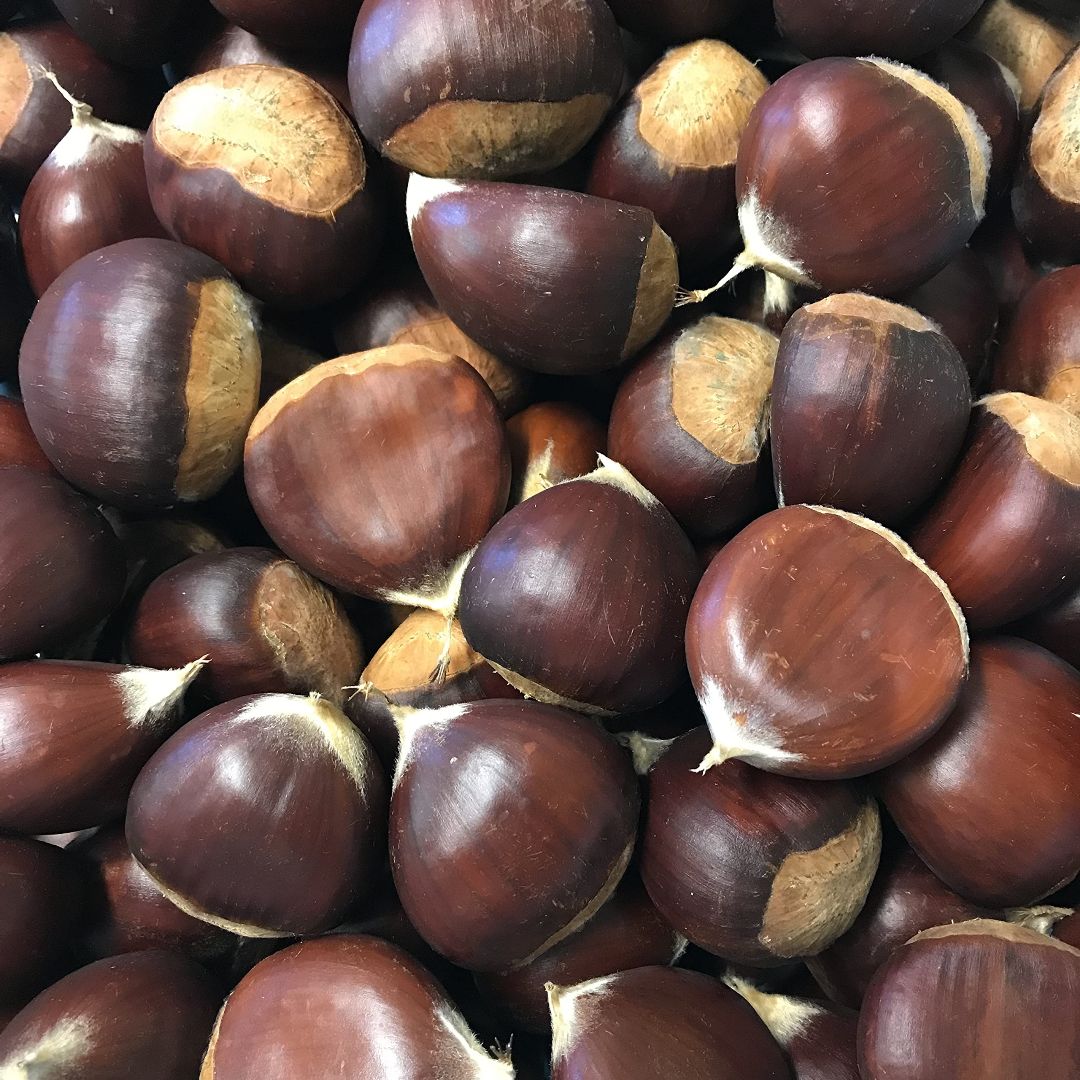
Chestnuts
Chestnuts are the edible nuts from the Castanea tree species, known for their sweet, earthy flavor and smooth, starchy texture. Unlike other nuts, chestnuts have a soft, low-fat flesh, making them a healthy and versatile ingredient in a variety of dishes. They are traditionally enjoyed roasted, but can also be used in soups, stews, desserts, and as a flour substitute. Chestnuts are rich in complex carbohydrates, vitamins, and minerals, offering several health benefits, including support for digestive health, immune function, and heart health.
- High Nutritional Value
- Certified Organic Sources
- No Chemicals & Pesticides
- Worldwide Shipping
- Money back guarantee
- 24/7 Customer Support
Description
Chestnuts are the edible nuts from the Castanea tree species, known for their sweet, earthy flavor and smooth, starchy texture. Unlike other nuts, chestnuts have a soft, low-fat flesh, making them a healthy and versatile ingredient in a variety of dishes. They are traditionally enjoyed roasted, but can also be used in soups, stews, desserts, and as a flour substitute. Chestnuts are rich in complex carbohydrates, vitamins, and minerals, offering several health benefits, including support for digestive health, immune function, and heart health.
Fresh chestnuts are available seasonally, while dried, roasted, and pre-packaged varieties are available year-round. Chestnuts can be enjoyed as a snack, used in baking, or incorporated into both sweet and savory recipes.
Key Features:
- Naturally Low in Fat: Chestnuts have a lower fat content compared to most other nuts, making them a healthier alternative.
- Rich in Carbohydrates: A good source of complex carbohydrates, providing long-lasting energy.
- High in Fiber: Contains significant amounts of dietary fiber, promoting healthy digestion.
- Packed with Nutrients: Contains vitamin C, B vitamins, and minerals like potassium, iron, and magnesium.
- Gluten-Free: Suitable for those following a gluten-free diet.
- Versatile: Can be enjoyed roasted, used in stuffing, soups, stews, pastries, and even made into chestnut flour.
1. Product Details:
- Source: Premium-quality chestnuts sourced from European, American, or Asian varieties, depending on availability
- Packaging: Available in whole chestnuts, roasted chestnuts, and chestnut flour in various sizes
- Appearance:
- Whole Chestnuts: Brown, shiny, with a hard outer shell and a pointed tip
- Roasted Chestnuts: Typically peeled, with a golden-brown color and a soft, tender flesh
- Chestnut Flour: Fine, off-white flour, with a mild nutty flavor
2. Nutritional Information (per 100g):
- Calories: 213 kcal
- Total Fat: 2.2g
- Saturated Fat: 0.2g
- Monounsaturated Fat: 1.1g
- Polyunsaturated Fat: 0.8g
- Cholesterol: 0mg
- Carbohydrates: 45g
- Dietary Fiber: 8.1g
- Sugars: 9g
- Protein: 2.4g
- Vitamins & Nutrients:
- Vitamin C: 43.1mg (supports immune health and acts as an antioxidant)
- B Vitamins:
- Thiamine (B1): 0.2mg
- Riboflavin (B2): 0.1mg
- Niacin (B3): 1.1mg
- Pantothenic Acid (B5): 0.5mg
- Potassium: 452mg (supports muscle function and hydration)
- Iron: 1.2mg (supports oxygen transport and red blood cell production)
- Magnesium: 32mg (important for bone health and muscle function)
3. Storage & Shelf Life:
- Storage Conditions:
- Whole Chestnuts should be stored in a cool, dry place or refrigerated if fresh. They should be consumed within a few weeks of purchase if not roasted or dried.
- Roasted Chestnuts should be kept in airtight containers and stored in a cool, dry place. For extended shelf life, they can be stored in the freezer.
- Chestnut Flour should be kept in an airtight container in a cool, dry place.
- Shelf Life:
- Whole Chestnuts: Typically last 2-3 weeks if stored properly or 6-12 months if frozen
- Roasted Chestnuts: Can last 6 months when properly stored in an airtight container
- Chestnut Flour: Typically lasts 6-12 months, depending on storage conditions
4. Uses & Applications:
- Culinary Uses:
- Roasted Chestnuts: Traditionally enjoyed as a snack (hot or cold) and used in holiday dishes
- Chestnut Flour: Used as a gluten-free substitute for regular flour in breads, cakes, pancakes, and pastries
- Chestnut Puree: Used in soups, stews, stuffing, and desserts like chestnut tarts and chestnut mousse
- Chestnut Stuffing: A popular filling for roast meats, such as turkey or chicken
- Chestnut Soup: A creamy, rich soup, often flavored with herbs, garlic, and vegetables
- Chestnut Chips: Can be used to create a crunchy addition to salads or enjoyed as a snack
- Health Benefits:
- Heart Health: Chestnuts are rich in antioxidants and fiber, supporting heart health by lowering cholesterol and promoting healthy blood vessels
- Digestive Health: The fiber in chestnuts supports gut health and aids in digestion
- Energy Boost: The complex carbohydrates in chestnuts provide long-lasting energy
- Skin Health: Rich in vitamin C, chestnuts help fight free radicals and maintain healthy skin
- Weight Management: Low in fat and high in fiber, chestnuts make for a filling, nutritious snack, supporting weight control
- Industrial Uses:
- Chestnuts are used in the production of chestnut oil, which is used for cosmetics and skincare products due to its hydrating properties
- Chestnut shells can be used for composting or in the production of biofuels
For more information, pricing, shipping details, or to place an order, feel free to contact us!
